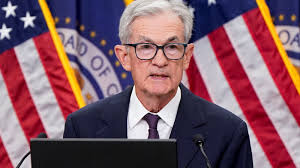Federal Reserve Chair Jerome Powell recently addressed the elevated levels of asset prices, including stocks and other risk instruments, during a speech in Providence, Rhode Island. Powell highlighted how the central bank assesses overall financial conditions and whether their policies influence these conditions in alignment with their objectives. He acknowledged that equity prices are currently highly valued, which was reflected in the strong market rally leading up to the recent policy meetings where expectations of a rate cut were high.
Following the decision to lower the benchmark overnight borrowing rate by a quarter percentage point, stocks continued to surge, setting new record highs for major averages. Powell emphasized that the market reacts to the Fed's signals, indicating that investors adjust their expectations concerning the direction of interest rates.
Despite recognizing the lofty equity values, Powell mentioned that the current climate does not present significant risks to financial stability. However, after Powell's comments, stock markets experienced a downturn, with major averages trading in the red. This shift underscores the impact that statements from Fed officials can have on market sentiment and asset prices.
During his speech at the Greater Providence Chamber of Commerce's annual Economic Outlook Luncheon, Powell discussed the challenges facing the labor market in the U.S. He highlighted a significant slowdown in hiring, attributing it to uncertainties surrounding economic policies. Powell noted that inflation remains elevated, presenting a delicate balancing act for policymakers trying to uphold the dual mandate of maximum employment and stable prices.
The recent rate cut decision was made in response to concerns over a weakening job market and inflation levels exceeding the central bank's target. Powell reiterated that there are risks to both inflation and employment, emphasizing the complexity of the current economic environment. With the unemployment rate rising and job creation slowing down, companies are exhibiting caution in their hiring practices amid a landscape of policy uncertainties.
One notable factor affecting the job market is the decline in the supply of workers due to stringent immigration policies implemented by the administration. The reduction in immigration levels has led to a decrease in labor force growth, further complicating the hiring dynamics in the economy. Powell pointed out that the recent policy changes in areas such as trade, including tariff increases, have added to the economic uncertainty and could impact inflation levels.
The tariffs imposed by the U.S. government have generated revenue but have also raised concerns about potential price hikes. Powell highlighted that the effects of tariffs on inflation have been modest so far, with retailers and importers absorbing most of the increased costs. However, he cautioned that if companies pass on these costs to consumers, it could lead to higher inflation in the future.
Amid the economic challenges and policy uncertainties, Powell emphasized the Fed's independence in making monetary policy decisions, separate from political influences. He underlined that the primary focus is on serving the best interests of the people in the medium term, rather than catering to political agendas.
Powell's remarks shed light on the intricacies of the current economic landscape, where policymakers are navigating through a complex web of challenges ranging from subdued hiring to inflationary pressures. The Fed's actions and statements continue to have a significant impact on financial markets, shaping investor sentiment and asset valuations in a dynamic environment.

